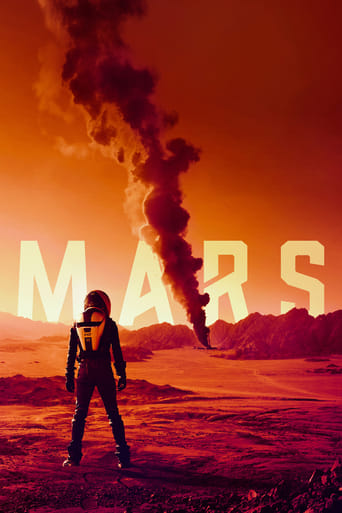

Gripping story with well-crafted characters
... View Moreeverything you have heard about this movie is true.
... View MoreClever and entertaining enough to recommend even to members of the 1%
... View MoreEasily the biggest piece of Right wing non sense propaganda I ever saw.
... View MoreThe documentary sections are OK, the special effects are competent, but the dramatic parts are unsatisfying and faintly hilarious. Thrill to stodgy dialogue delivered in monotones, in a tale of the greatest adventure mankind has ever undertaken! Wonder why, if electrical power is so precious in the hostile Martian environment, does nobody turn off some of those darned lights and monitors! (Come on, this isn't rocket science). The video diary device is overused as a way to flesh out character, and is really no substitute for decent scriptwriting and acting. The astronauts don't seem very astronauty, more like annoying co-workers you try to avoid around the water cooler. And the way they conduct themselves in the course of their mission...well, just watch any Shuttle-related YouTube video for clues as to how real astronauts behave (writers, producers and directors of this show, I'm talking to YOU!). But what I really want to know (I don't think this counts as a spoiler) is how did the commander maintain her stylish short haircut, and the doctor her nifty bob, during their stay on Mars? Was there a mission stylist we never met?
... View MoreThis show makes the most boring moments of 2001 A Space Odyssey seem exciting. It was a big rip of the most boring tech moments of 2001 A Space Odyssey, Alien, and a few other movies. I turned it off at the point one of the astronauts is floating around in a hallway trying to take apart the panels of the ship in order to fix some wiring. Really?? Even in 1968, the space ships were more advanced. Star Trek and Lost in Space were more advanced. This looked like a B movie space ship from the 1950s. Having a monotone voice narrating most of the scenes for the sake of the "docu-drama" cred only made it ten times more boring. Dialogue like "Johnny promised us the technology, and he delivered." Blah Blah Blah, show us the technology. A wall full of air conditioning filter panels is not going to get anyone to Mars.
... View MoreMy expectations were sky high for Mars, a national geographic mini-series produced by Ron Howard that promised to be the definitive word on Man's first mission to the Red Planet. The subject has fascinated me since I was a kid, watching the Spirit and Opportunity rovers land on the surface of Mars in 2004. As someone interested in the material, I saw this new Mars documentary as an opportunity to catch up on the most current thoughts about a manned mission to Mars. However, this National Geographic mini-series squanders the opportunity, providing precious little in the way of concrete information about a mission to Mars, and providing far too much in the way of ponderous melodrama.The series is split between a documentary-style exploration of the newest technologies and theories regarding a Mars mission, and a fictional story of what a Mars mission might look like (Titles cards "2016" and "2033" note the changes). In the right hands, this structure might work, but even with a big name like Ron Howard attached, Mars is a thorough failure in both ways.To begin with, it should be noted that while the series is split between two stories, the attention given is not 50/50. The 2033 story takes up about 75% of the series, and that is a two-folded problem. One, the 2033 story is totally uninteresting, and two, it limits what the 2016 story can tell. The result is a documentary that has nothing to teach. The entire 2016 portion of the series is made up of nebulous pontificating about the importance of a manned mission to Mars. We get a non-stop barrage of lines like, "We look to the stars" "It is our destiny as human beings", "A paradigm shift for humanity", and so on, without a single word about the science or engineering challenges of such a mission. Even the scenes such as the SpaceX launch or the spotlight on astronaut Mark Kelly, where the series should be able to provide some facts, Mars uses as an opportunity for more pretentious melodrama. I want to know how a SpaceX rocket would land on Mars, I don't care about what Elon Musk felt like when he launched a prototype. I want to know what an astronaut would do during a flight to Mars, I don't care what his daughter thinks about him while he's up there.Nowhere is the melodrama more apparent than in the fictional 2033 section of the series. It is apparent from the first 10 minutes of the first episode, that Mars' fictional section has no interest in realism. The "diverse" cast is made up of walking cartoons (How many tough foreign women and Africans are we sending to Mars?), and they apparently spend the entirety of their trip in cartoon action scenes. The way this series handles deaths on Mars is somehow both outlandishly juvenile and stupefyingly pretentious (The scene where the plant guy goes crazy and kills a bunch of people is one of the stupidest things I'll ever see). What makes matters worse is the look of the 2033 sections. Mars has never looked uglier. Barren as it is, the real Mars has a kind of untouched beauty. With director Everardo Gout, Mars has the oppressive gray sheen of the worst that digital videography has to offer. Even with a noticeably expensive production, Mars is a horrible visual experience where it should be great.National Geographic's Mars is a monumental disappointment for me. I was ready for a big-budget update on the continuing struggle to put a man on Mars. Unfortunately, this series is all melodrama. Mars is not interested in educating anyone about the Red Planet or how we might get there. What we get is a self-important mess, a lecture about nothing, a terrible documentary and an embarrassing drama. If you are looking for a series with actual information about a manned mission to Mars as well as a fictionalized account of such a mission, check out Mars Rising and Race To Mars. Neither are perfect, but they are a world more substantial than this National Geographic series.23/100
... View MoreI enjoyed Mars, mainly because I like space exploration and the tech involved. The mixing of documentary footage, interviews of real people and then hopping forward in time to the fictional mission worked quite well. What I didn't like were the implausible series of disasters besetting the crew.During the Apollo era every activity to be undertaken either in the spacecraft or on the surface in EVA suits was meticulously planned and rehearsed hundreds of times. How likely would it be for a situation to arise on Mars where they would bungle sorting out their power supply, and have that happen right when the worst dust storm in history occurs... Like they would not have seen the weather system developing in time to bring forward the power cable work, or have extra people out there for such a mission critical EVA?And the lack of dual airlocks in the plant laboratory for dramatic license when the plant guy goes bananas... Not to mention that no one noticed he was that far over the edge until too late.A real shame they did not focus on the science on Mars and the real issues, rather than trying to make it into a TV movie.
... View More